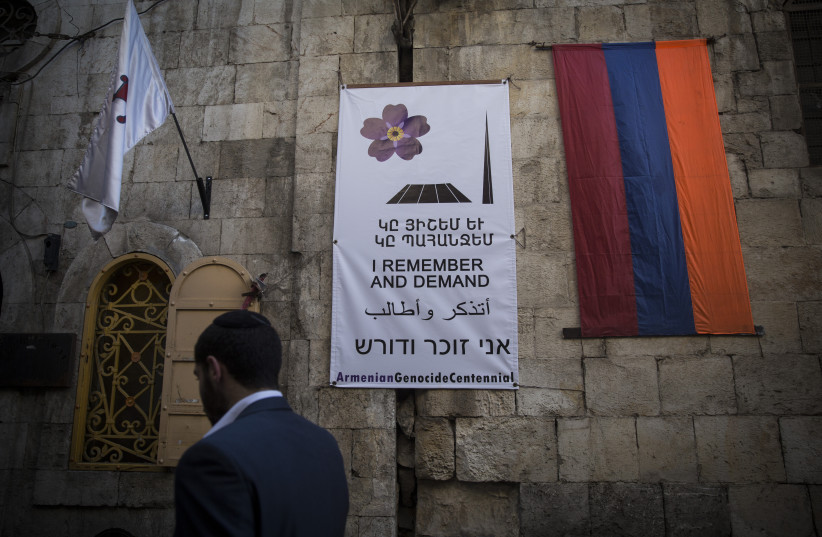With so many tragic events occurring around the world this month, there is a certain irony in the fact that April is in fact Genocide Awareness Month – even as Russian forces brutally butcher Ukrainian civilians, and Israeli civilians are once again targets of barbaric terror attacks and rocket fire from terrorist organizations in Gaza.
Genocide Awareness Month is when we mark Yom Hashoah, Israeli Holocaust Remembrance Day, as well as the Armenian Genocide Remembrance Day April 24. But, Genocide Awareness Month is not held in April for only these two tragic events. On April 19, 1975, the Cambodian genocide began, and on April 7, 1994, the genocide against the Tutsi in Rwanda began, as well. These dates and this month remind us that there is no better time than now to remember the past and take responsibility to ensure that “never again” is the reality. So, as civilians are mass executed in Ukraine, we have a global responsibility to ask: Are we doing enough?
The answer may well be “no” if we consider recent statistics from Europe and the United States. Two thirds of millennials don’t know that six million Jews died in the Holocaust, according to recent surveys. Half of Britons surveyed didn’t know the same and 20% of Europeans surveyed think the Jews exploit the Holocaust today. In the case of the Armenian Genocide, the perpetrators themselves still haven’t taken responsibility. Today, one of the most difficult challenges when it comes to Holocaust education and genocide awareness is dealing with denial and minimization.
Holocaust denial and revisionism are ongoing challenges especially in the realm of social media, where conspiracies and fake news run rampant. Though all platforms explicitly ban Holocaust denial, both denial and revisionism are easily found on any of the platforms. In Arabic social media in particular there is a lack of understanding about the Holocaust that is often entangled in political arguments over Israel. This does a tremendous disservice to genocide awareness, which is a universal cause. A similar phenomenon occurs at the state level with regimes like Iran, whose official policy is one of Holocaust denial.
The battle for recognition of the Armenian genocide has been ongoing for decades. Only 33 countries have formally recognized the Armenian Genocide and sadly Israel is not one of them.

Between 1-1.5 million ethnic Armenian Christians were systematically murdered by the Ottoman Turks in the Armenian Genocide, which began in April 1915. In the aftermath, Turkey, which is the modern descendant of the Ottoman Turks, has gone to great lengths to deny the genocide and refuse to take responsibility, much less make reparations. It has been the policy of every Turkish government to deny the genocide and in some cases to punish Turks who do publicly recognize it. Further, Turkey has destroyed evidence of genocidal crimes and threatened diplomatic crises with other sovereign nations who do recognize the Armenian Genocide.
When the US Congress and president finally recognized the Armenian genocide in 2021, Turkey strongly condemned the action and threatened relations with both the US and NATO. Turkish officials called the announcement of recognition by President Joe Biden outrageous and stated there would be reactions of different forms and kinds and degrees in coming days and months. Similarly, in 2010, when the issue arose with Sweden and the US recognizing the genocide, Turkey threatened to expel 100,000 Armenians in Turkey in retaliation.
Turkey has repeatedly threatened Israel and the fragile diplomatic relations between the two, over the issue of the Armenian genocide, which is in part the reason for Israel’s continued and embarrassing moral failure to recognize the genocide formally. Yet, how are we in Israel, or globally, expected to educate about genocide and prevent further atrocities when political considerations prevent us from even acknowledging what happened?
Some things should rise above politics, and genocide recognition is one of them. Genocide should not be used to score political points nor to promote antisemitic policies (as Iran does), nor should it be used to bully the world due to security and diplomatic considerations as Turkey is doing.
End Holocaust denial. End genocide denial. Blindness to the past impedes building a better future.
The writer is the CEO of Social Lite Creative LLC.
